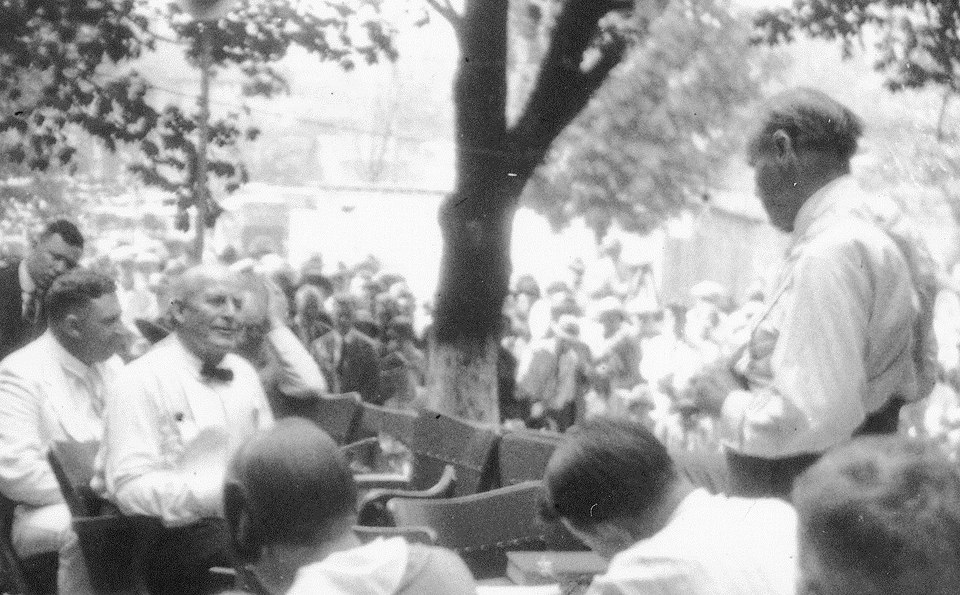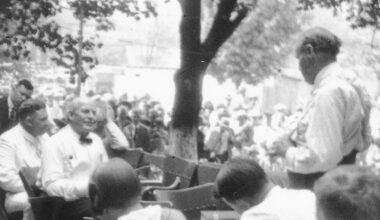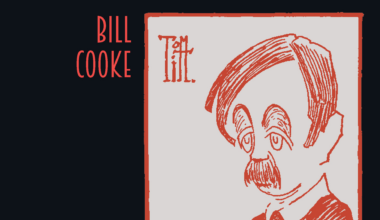100 years ago this month, in Dayton, Tennessee, before a host of the world’s media, one of the most infamous conflicts between science and religious belief took place. In the fierce heat at the heart of the Bible Belt, in a thronged courtroom, a literal interpretation of the book of Genesis was pitted against Darwin’s most famous theory. The first trial in American history to be broadcast live, it became a farcical spectacle, a battle that left no one satisfied and yielded no true winner.
The latter half of the nineteenth century saw another great American religious awakening. Around the same time as Darwin’s Origin of Species was published in Britain, church attendance and fundamentalism exploded across Tennessee and its neighbouring states. As the twentieth century began, similar movements such as the Azuza Street Revival in 1906 saw the birth of Pentecostalism and an increase in religious enthusiasm. As acceptance of human evolution became mainstream in the aftermath of Darwin’s 1871 Descent of Man, a collision between American fundamentalist religion and modern evolutionary theory loomed as an inevitability.
Earlier in 1925, Tennessee passed its Butler Act, making it a crime for public school teachers to deny the Genesis account of humanity’s beginnings or to teach human evolution. Both scientists and the irreligious saw this as a flagrant violation of the separation of church and state and the right to free speech, as well as a serious overreach of fundamentalism into the education sector.
John T. Scopes was the teacher who incriminated himself in aid of the American Civil Liberties Union, which planned to bring a test case of the law and challenge its constitutionality. Scopes later confessed that he could not actually remember teaching human evolution. But this was immaterial. When he was charged, both sides of the debate saw the opportunity to put their case to a national audience. Few, however, could have predicted the level of global interest.
The prosecution’s champion was a three-time presidential candidate, ‘the Great Commoner’ William Jennings Bryan. A humble man who was prized as a hero of the common folk, Bryan was proud of his personal faith and eager to celebrate humankind’s place below the angels but above the rest of nature. The ace for the defence was agnostic and cutthroat attorney Clarence Darrow, who, the previous year, had rescued two murderers from the death penalty with an argument from determinism. Both men took the case free of charge and must have realised early on what it would mean for their reputations. Interestingly, each was seeking the guilty verdict for very different reasons: Darrow to bring the case to appeal at a higher court, and Bryan to vindicate mankind’s place in the universe as a special creation.
While the trial was held, between 10 and 21 July 1925, the whole world seemed to descend on the tiny town of Dayton. The BBC was covering it daily with special news broadcasts beamed into cinemas and across the radio. The trial helped to make H. L. Mencken’s name as a journalist; he wrote scathingly of Bryan and the anti-evolutionists, and it was he who coined the name ‘Monkey Trial’ to describe the events in Dayton. Scopes himself seemed an afterthought when set against all this spectacle.
Perhaps the most spectacular thing of all, though, was the sight of the two great legal counsels in battle. At the trial’s climax, Darrow called Bryan himself to the stand in an attempt to humiliate him. He examined Bryan on his scientific knowledge and personal convictions, for which Bryan seemed ill-prepared. Himself a ‘day-age’ creationist, Bryan was more concerned with the social consequences of evolution than its scientific merit. The move by Darrow was pure theatre, subsequently struck by the judge.

In the end, the judge ruled against Scopes, who was fined $100, the equivalent of $1,800 today, which the defence paid on his behalf (the verdict was later overturned on a technicality). Darrow’s reputation as a fierce combatant grew, but Bryan died just a few days later in Dayton. Bryan had not fared well in the reporting of the trial, branded as a picture of Southern ignorance and anti-intellectualism. Mencken, an acerbic atheist, tore into him with particular venom and relish.
Both sides immediately entrenched. Across the nation, sentiments hardened. A desire to drive science forward against ideological resistance was met by the equally passionate desire of other states to suddenly devise their own versions of the Butler Act and direct school curricula according to their wishes. A stalemate ensued.
The Scopes Trial lived on in movies, plays, and songs. The most famous is probably the 1960 film Inherit the Wind, based on a 1955 play of the same name, which presents a picture of blind fundamentalism versus science. This is best articulated by a scene in which the gathering crowds outside the court proceedings are waving crosses whilst singing ‘Gimme that old-time religion’.
Where the trial succeeded in driving fundamentalist opposition against science to the front of the public consciousness, one cannot make any strong case that this was a victory for reason. Although the Butler Act was eventually repealed in 1967, subsequent trials and controversies concerning the encroachment of creationism into education have come and gone like the tide. The 2005 Kitzmiller v. Dover trial over the teaching of ‘intelligent design’ theory shows that even 80 years later, the ghosts of Scopes are still among us, even if they wear new costumes. The battles continue, and we seem no wiser. If anything, those of us who value science are a little tired of having to repeat this process decade after decade despite winning each time.
Old-time religion is still here, and old habits die hard.
Related reading
Why Design Arguments Necessarily Fail, by Samuel McKee
The future of biology, science vs. religion, and ‘ideological pollution’ in science: Interview with Jerry Coyne, by Samuel McKee
Reality always wins: the perils of ideological science, by Samuel McKee
A farewell to Dawkins? by Samuel McKee
Bringing back the dialectic: interview with Stephen ‘Rationality Rules’ Woodford, by Samuel McKee








3 comments
“The battles continue, and we seem no wiser.”
The above statement requires some explanation, because I see it as denying the huge progress against religion has been achieved in the West – in my lifetime, let alone since the Enlightenment.
A truly captivating recounting of a pivotal moment where science and belief collided under the public eye. Thank you for this well-balanced and vividly told reflection — a sobering reminder that, while the stage changes, the core debate persists. The legacy of Scopes echoes on, not just as history, but as a cautionary tale for today
Regard Unissula
The core debate may persist, but the Enlightenment side has clearly won. Teaching evolution is now ubiquitous across America, while teaching creationism is illegal.
Your email address will not be published. Comments are subject to our Community Guidelines. Required fields are marked *
Donate